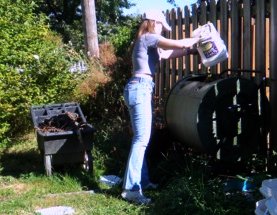
There are many benefits to composting and just about anyone can do it. It's a great way to recycle kitchen scraps and yard debris, and keeps a lot of waste out of the landfills. You might be surprised at what can be safely composted. Everyday household items including cardboard tubes, newspaper, eggshells, fruit and vegetable scraps, coffee grounds, and leaves can be composted. Compost enriches the garden soil and provides essential nutrients to plants and eliminates the need for adding chemicals. Compost improves all types of soil, whether you have heavy clay like I do, or coarse sandy soil. In clay soil compost helps loosen up the soil and in sandy soil it helps the soil retain water better. Compost can even help prevent some soil borne diseases. Using compost in your garden reduces the need for additional fertilizers, pesticides, and extra water. I've been adding compost to my garden, which started out as hard packed clay with virtually no worms or insects, for the last 5 years and have seen an incredible improvement in the texture of the soil and the quality of the plants and vegetables. I now have a thriving earthworm population, and all sorts of other beneficial insects that call my garden home. Composting replicates nature's system for feeding plants by turning organic waste into rich hummus. Below is a basic recipe for making compost. With fall right around the corner, you'll be finding plenty of ingredients in your yard for compost.
Green plant matter includes: lawn clippings, old vegetable vines, weeds that haven't gone to seed, hedge clippings, vegetable and fruit skins and trimmings.
Dry plant matter includes: fallen leaves, straw, small twigs, cornstalks, and black and white newspaper.
To make your compost:
1. Combine your ingredients in a compost bin (I use a Compost Tumbler, which works well in the suburbs). You want your mixture to include both green and dry materials. To speed up the composting process you can chop or shred the materials and add compost inoculant (available from most organic gardening sites).
2. Moisten the pile with the hose, but don't saturate it. You want it evenly moist, but not sitting in water.
3. Turn the pile at least once a week. I usually turn mine every few days to keep everything well mixed. This allows air to move through the pile so the microbes get enough oxygen to break down the materials quickly.
4. Allow the compost to cook. You want the pile to get nice and hot (I've had mine up to about 120 degrees) in order to kill any pathogens and weed seeds. Check the pile regularly, especially during hot weather, and water as necessary to keep it moist. In about a month you can start checking for finished compost. When it's ready to be used in the garden it will be dark, moist, and crumbly. It won't smell rotten, but will actually have a sweet earthy odor.
Happy gardening! :-)
-Michelle of
CreativeCritters









No comments:
Post a Comment